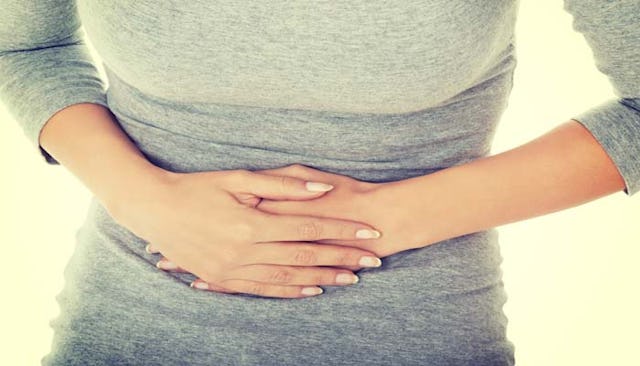Expert Compares Period Pain To A Heart Attack, Men Everywhere Still Thinks It's NBD

Hey guys! Ever endured a hard day at work whilst feeling like someone is literally ripping your insides out with a melon-baller? Many women have, which is why we tend to look like we’re going to rip your face off if you make some flippant comment about “that time of the month.”
For some women, “that time of the month” is actually really, fucking horrible. And painful. And it’s time for it to cease being a punchline. When someone in your life who happens to not have a uterus and therefore has no idea how utterly painful menstrual cramps can be minimizes the agony you’re feeling — it’s bad. When it’s your doctor — it’s inexcusable.
It turns out one in five women have debilitating pain every month with their periods, and doctors may not be doing enough to treat it. In the piece, “It’s time to talk about period pain,” Quartz writer Olivia Goldhill attempts to uncover the reason women are given so few options when it comes to dealing with menstrual pain. Her own experience with debilitating pain led her to seek out some answers.
Goldhill talked to John Guillebaud, professor of reproductive health at University College London. He told her the cramping can be as “bad as having a heart attack.” If that’s true, and women are suffering this much, why isn’t more research being done to get to the bottom of an effective treatment? Goldhill has been through two slipped discs and says the pain she now experiences monthly is comparable.
“Before I had my MRI scans, I told my primary care doctor that the pain seemed to be triggered by my period. He didn’t think this was relevant and ignored the comment,” she writes. “Later, when scans showed my discs were in place, the specialist said my pain was likely due to nerve inflammation—just one of those painful things that someone with my history would likely suffer from time to time. Once again, his eyes flicked to the side and he waved his hands dismissively when I asked if it could be connected to my menstrual cycle.”
Next she visited her gynecologist who took an ultrasound, said everything looked “normal” and recommended she go on birth control indefinitely — the idea being to make her periods stop. “When I asked about the risks, she told me it could lead to blood clots and increased risk of breast cancer—but that one in eight women get breast cancer anyway, so I shouldn’t be overly worried,” Goldhill says. What?
All of her research led her to two main causes of period pain: primary dysmenorrhea and endometriosis: “The former is simply painful periods, with no certain medical explanation, that tends to affect women as soon as they start menstruation. But the distinction between the two conditions is not clear-cut, as many women suffering dysmenorrhea may have undiagnosed endometriosis. It’s estimated that while 20% of women have the former, around 10% of ovulating women in the US have endometriosis, and it takes on average 10 years to get an accurate diagnosis.”
Okay, so one in five women has painful periods with no explanation, and one in ten has endometriosis. Yet the existing treatment for the former is basically, “take some ibuprofen.” In the case of endometriosis, actual surgery may need to be performed to relieve pain by removing the tissue. In some cases, a hysterectomy is the only thing that makes the pain go away.
Why do some women suffer more than others? “That’s a million dollar question that we don’t really understand,” Richard Legro, M.D., of Penn State College of Medicine, told Quartz:
“Legro says that without a lobby championing the need for research, researchers won’t start paying more attention to the condition. He points out that public discussion of period pain is widely kept hush. For example, he says that in the US, several news channels are reluctant to use the words ‘vagina’ or ‘menstrual bleeding,’ which makes it practically impossible to discuss painful periods.”
There’s nothing shameful about the word “vagina.” Or the words “menstrual bleeding.” The pain women experience isn’t funny. It’s not a punchline. It’s not something men should be rolling their eyes over at the water cooler.
“Men don’t get it and it hasn’t been given the centrality it should have. I do believe it’s something that should be taken care of, like anything else in medicine,” added Guillebaud.
Yeah. That would be nice.
This article was originally published on